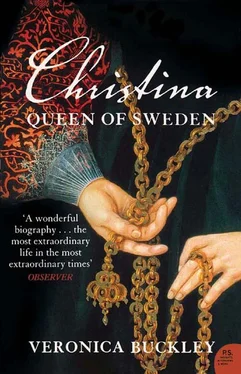Christina’s world was a world of vibrant learning, of philosophy and poetry, of religious scholarship and scientific experiment. It had begun its long, deep love affair with the world of classical antiquity, now resurgent after the exotic lures of the great age of exploration; on the foundations of this ancient world new temples were being built to Greek thinking and the manly virtues of Rome. Renaissance ideas persisted, too, not least in the widespread practice of alchemy, consuming fortunes and lifetimes in a misbegotten search for truth.
And, while Europe’s princes fought among themselves, their Christian world faced two mightier enemies, from without and from within. The external threat was the great Ottoman Empire of the Turks, which at Christina’s birth stretched from Algiers to Baghdad and as far west as Budapest. Late in her life she would hear of a vast Turkish army pitching its tents at the very gates of Vienna. But it was the internal enemy that in the long run would prove the more decisive. With their stumbling, excited experiments, Europe’s ‘natural philosophers’ had begun their challenge to religious orthodoxy. With increasing success, they now strove to provide materialist explanations of the natural world. Though most were repaid with hostility and persecution, and some even with death, no Church, and no state, could stop them. The great march of empirical science had begun, and all ears, willing and unwilling, heard the beat of its tremendous drum.
Christina’s world was a crossroads world, where God still ruled, but men had begun to doubt. She herself would stand at many crossroads, of religion and power, of science and society and sex. And she would prove a dazzling exemplar of her own quixotic era, an exemplar of great, flawed beauty, like the misshapen baroque pearl that would give its name to her vibrant, violent age.
In the spring of 1620, a delegation of German nobles made their way along the Spree river, towards the town of Berlin. The town was not what it had been; years of plague had depleted its people, and its once thriving trade had dwindled to the narrow service of luxury goods to its resident court. Now, among the low wooden buildings, only the vast old castle impressed upon the visitor that Berlin was still a place of power, the residence of the Hohenzollern family of Brandenburg, Electors of the Holy Roman Empire. For just a year, a new Elector, the young Georg Wilhelm, had held that stately office.
Now, towards the castle, the nobles rode, down the bridle path under the linden trees which would one day give their name to the town’s most lovely thoroughfare. The delegation was led by Johann Kasimir, the Count of Pfalz-Zweibrücken, and in his train were two young gentlemen who had joined him from the homeland of his wife, the Princess Katarina of Sweden. One of these was ‘Adolf Karlsson’, a strongly built and handsome man with the blond hair and keen blue eyes of the north. The other, his friend, was Johan Hand, whose diary of their journey was to provide an historic chapter in the annals of their homeland.
The Count was related to the Elector’s wife, Elisabeth, and it was ostensibly to see this princess that he had made his present journey. The visit had been timed strategically, for the Elector Georg Wilhelm himself was not at home, nor did the Count regret his absence. A matter of importance was now at hand, in which the Elector’s mother, the Electress Dowager Anna, would cast the deciding vote. The Count had hopes of persuading her to his own views, and he knew that Anna would hear him more readily if her son was not there to speak against him. The matter at hand was no less than the marriage of Anna’s daughter, Maria Eleonora, and the bridegroom proposed was the Count’s own brother-in-law, Gustav Adolf, King of Sweden. He had made the journey himself, just to have a look at the lady, for ‘Adolf Karlsson’ was in fact the King.
A marriage between Maria Eleonora, now aged twenty, and Gustav Adolf, five years her senior, had been under consideration for some years already. Offers for the hand of the young Countess were not wanting: among her suitors she could boast Gustav Adolf’s cousin, the Crown Prince Wladislaw Vasa of Poland, and Prince Charles Stuart, heir to the English throne. Her father had been ambivalent towards a possible Swedish match, but his son, the new Elector, had taken a clear stand against it. He had no wish to antagonize the Catholic Emperor, or the King of neighbouring Catholic Poland, whose vast country lay only two days’ march from Berlin. The Swedes were already at war there, and Georg Wilhelm thought little of their chance of victory. Though a Calvinist himself, and ruler of a Lutheran state, he felt his sister would do better to marry the Crown Prince of Poland. In the Habsburg lands, not so far to the south, the Emperor had recently reasserted his power over the luckless Protestants of Bohemia, whose ill-starred ‘Winter King’ was the brother of Georg Wilhelm’s own wife. Religious neutrality seemed the wisest course as the match set in Prague began to kindle. But, by family custom, it was the privilege of the Electress to decide her daughter’s marriage, and on this the Swedes had pinned their hopes. An alliance with Brandenburg could strengthen their hand against Poland, and might hasten the formation of a new bloc of Protestant states against the Catholic Habsburgs. The Elector’s fear was Gustav Adolf’s hope.
For his journey now, however, the young King had paid a great personal price. A spirited and warmhearted man, he had been passionately in love with the daughter of one of Sweden’s noblest families, the beautiful Ebba Brahe. Ebba had returned his love, but the King’s strongminded mother had felt that a match between them would not serve Sweden’s dynastic interests. Intriguing and determined, she had set to with a will to break off the romance, at one point even laying her own violent hand on the lovers’ go-between. In due course, she had succeeded. Ebba was married off to the scion of another noble family. The sad and disappointed King dispatched a beautiful letter of farewell, wishing his love ‘a thousand nights of gladness’ in her husband’s arms, and at length he turned his thoughts towards Brandenburg, where his mother’s gaze had long been fixed.
Happily, the object of his present attentions was well formed to incite new passion in the young man’s heart. Maria Eleonora was a genuine beauty, her figure rounded, her face soft and full, with a sweet bow mouth, a strong nose, and large, beautiful eyes. She was blonde, and her manner was lively, giving an impression of girlish gaiety to all those who saw her.
At first, though, it seemed that her young suitor might not succeed in seeing her at all. Her father had died in the previous December, and the court was still in mourning. Dark hangings draped the rooms, and the few permitted candles flickered on his doleful, black-garbed retainers. Five months after his death, the old Elector’s body lay still unburied in the castle chapel. The usual bustling life of the court was suspended, and visitors received only the simplest civilities. But the pulse of youth was strong in the burgeoning spring, and besides, Gustav Adolf could not afford to wait; there was too much to do at home. For a bribe of 300 ducats, he acquired a portrait of the young Countess, and, duly encouraged, arranged a secret rendezvous. It was a Sunday, and all the court was at church, all except Maria Eleonora, who had found some pretext for absenting herself. The Swedes, being Lutheran rather than Calvinist, could not, of course, attend, and soon the meeting was effected in the shade of the trees in the castle park. The Countess, at least, was not disappointed, as the King’s friend would later remind him. ‘Where the girl’s thoughts were, I couldn’t say,’ he wrote, ‘but she didn’t take her eyes off Your Majesty.’ 1
Читать дальше












